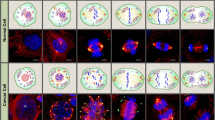Abstract
Inner centromere protein (INCENP) is a member of the Chromosomal Passenger Complex (CPC), which is a four member protein complex essential for proper completion of mitosis and cell division (cytokinesis). Inappropriate chromosomal segregation and cytokinesis due to deregulated expression of chromosome passenger proteins may lead to aneuploidy and cancer including lymphomas. According to our knowledge this is the first study investigating immunohistochemical expression of INCENP in lymphoma cases and cancer tissues in general. Our purpose was to characterize the expression of INCENP in cases of non-Hodgkin B-cell lymphomas, to compare the immunoreactivity between low and high grades and to evaluate the correlation between INCENP and MIB-1 labeling indices. We examined INCENP and MIB-1 immunoreactivity in paraffin sections of 55 samples of non-Hodgkin B-cell lymphomas, obtained from 55 patients, 31 men and 24 women. Thirty were of high grade and 25 were of low grade. Our results showed significantly higher nuclear immunohistochemical expression of INCENP in high grade B-cell lymphomas versus low grade ones. Also INCENP expression was significantly correlated with MIB-1 labeling index. Taken together our results point to a possible association between increased INCENP immunostaining and B-cell lymphoma aggressiveness and also stress the need for further investigating the expression of INCENP and other mitotic regulatory proteins in lymphomas and other malignant neoplasms.




Similar content being viewed by others
References
Ruchaud S, Carmena M, Earnshaw WC (2007) Chromosomal passengers: conducting cell division. Nat Rev Mol Cell Biol 8:798–812
Vader G, Medema RH, Lens SM (2006) The chromosomal passenger complex: guiding Aurora-B through mitosis. J Cell Biol 173:833–837
Klein UR, Nigg EA, Gruneberg U (2006) Centromere targeting of the chromosomal passenger complex requires a ternary subcomplex of Borealin, Survivin, and the N-terminal domain of INCENP. Mol Biol Cell 17:2547–2558
Cooke CA, Heck MM, Earnshaw WC (1987) The inner centromere protein (INCENP) antigens: movement from inner centromere to midbody during mitosis. J Cell Biol 105:2053–2067
Sessa F, Mapelli M, Ciferri C et al (2005) Mechanism of Aurora B activation by INCENP and inhibition by hesperadin. Mol Cell 18:379–391
Carmena M, Earnshaw WC (2006) INCENP at the kinase crossroads. Nat Cell Biol 8:110–111
Adams RR, Eckley DM, Vagnarelli P et al (2001) Human INCENP colocalizes with the Aurora-B/AIRK2 kinase on chromosomes and is overexpressed in tumour cells. Chromosoma 110:65–74
Cutts SM, Fowler KJ, Kile BT et al (1999) Defective chromosome segregation, microtubule bundling and nuclear bridging in inner centromere protein gene (Incenp)-disrupted mice. Hum Mol Genet 8:1145–1155
Nguyen HG, Ravid K (2006) Tetraploidy/aneuploidy and stem cells in cancer promotion: the role of chromosome passenger proteins. J Cell Physiol 208:12–22
Greaves S (2001) A roar for INCENP. Nat Cell Biol 3:E14
Wheatley SP, Carvalho A, Vagnarelli P, Earnshaw WC (2001) INCENP is required for proper targeting of survivin to the centromeres and the anaphase spindle during mitosis. Curr Biol 11:886–890
Gerlach U, Kayser G, Walch A et al (2006) Centrosome-, chromosomal-passenger- and cell-cycle-associated mRNAs are differentially regulated in the development of sporadic colorectal cancer. J Pathol 208:462–472
Jaffe ES, Harris NL, Stein H, Vardiman JW (2001) Pathology and genetics of tumours of haematopoietic and lymphoid tissues. World Health Organization Classification of Tumours. IARC, Lyon
Abramoff MD, Magelhaes PJ, Ram SJ (2004) Image processing with imageJ. Biophoton Int 11:36–42
Massagué J (2004) G1 cell-cycle control and cancer. Nature 432:298–306
Pérez de Castro I, de Cárcer G, Malumbres M (2007) A census of mitotic cancer genes: new insights into tumor cell biology and cancer therapy. Carcinogenesis 28:899–912
Storchova Z, Pellman D (2004) From polyploidy to aneuploidy, genome instability and cancer. Nat Rev Mol Cell Biol 5:45–54
Altieri DC (2003) Survivin in apoptosis control and cell cycle regulation in cancer. Prog Cell Cycle Res 5:447–452
Mainou-Fowler T, Overman LM, Dignum H et al (2008) A new subtype-specific monoclonal antibody for IAP-survivin identifies high-risk patients with diffuse large B-cell lymphoma and improves the prognostic value of bcl-2. Int J Oncol 32:59–68
Cong XL, Han ZC (2004) Survivin and leukaemia. Int J Hematol 80:232–238
Kajiwara Y, Yamasaki F, Hama S et al (2003) Expression of survivin in astrocytic tumors: Correlation with malignant grade and prognosis. Cancer 97:1077–1083
Li F (2005) Role of survivin and its splice variants in tumorigenesis. Br J Cancer 92:212–216
Araki K, Nozaki K, Ueba T, Tatsuka M, Hashimoto N (2004) High expression of Aurora-B/Aurora and Ipll-like midbody-associated protein (AIM-1) in astrocytomas. J Neurooncol 67:53–64
Sorrentino R, Libertini S, Pallante Pl et al (2005) Aurora B overexpression associates with the thyroid carcinoma undifferentiated phenotype and is required for thyroid carcinoma cell proliferation. J Clin Endocrinol Metab 90:928–935
Sistayanarain A, Tsuneyama K, Zheng H et al (2006) Expression of Aurora-B kinase and phosphorylated histone H3 in hepatocellular carcinoma. Anticancer Res 26:585–593
Chieffi P, Cozzolino L, Kisslinger A et al (2006) Aurora B expression directly correlates with prostate cancer malignancy and influence prostate cell proliferation. Prostate 66:326–333
Chang JL, Chen TH, Wang CF et al (2006) Borealin/Dasra B is a cell cycle-regulated chromosomal passenger protein and its nuclear accumulation is linked to poor prognosis for human gastric cancer. Exp Cell Res 312:962–973
Miller TP, Grogan TM, Dahlberg S et al (1994) Prognostic significance of the Ki-67-assosiated proliferative antigen in aggressive non-Hodgkin’s lymphomas: a prospective Southwest Oncology Group trial. Blood 83:1460–1466
Petit B, Chaury MP, Le Clorennec C et al (2005) Indolent lymphoplasmacytic and marginal zone B-cell lymphomas: absence of both IRF4 and Ki-67 expression identifies a better prognostic subgroup. Haematologica 90:200–206
Lehman NL, Tibshirani R, Hsu JY et al (2007) Oncogenic regulators and substrates of the anaphase promoting complex/cyclosome are frequently overexpressed in malignant tumors. Am J Pathol 170:1793–1805
Author information
Authors and Affiliations
Corresponding author
Rights and permissions
About this article
Cite this article
Barbanis, S., Ioannou, M., Kouvaras, E. et al. INCENP (Inner Centromere Protein) is Overexpressed in High Grade Non-Hodgkin B-cell Lymphomas. Pathol. Oncol. Res. 15, 11–17 (2009). https://doi.org/10.1007/s12253-008-9094-0
Received:
Accepted:
Published:
Issue Date:
DOI: https://doi.org/10.1007/s12253-008-9094-0




